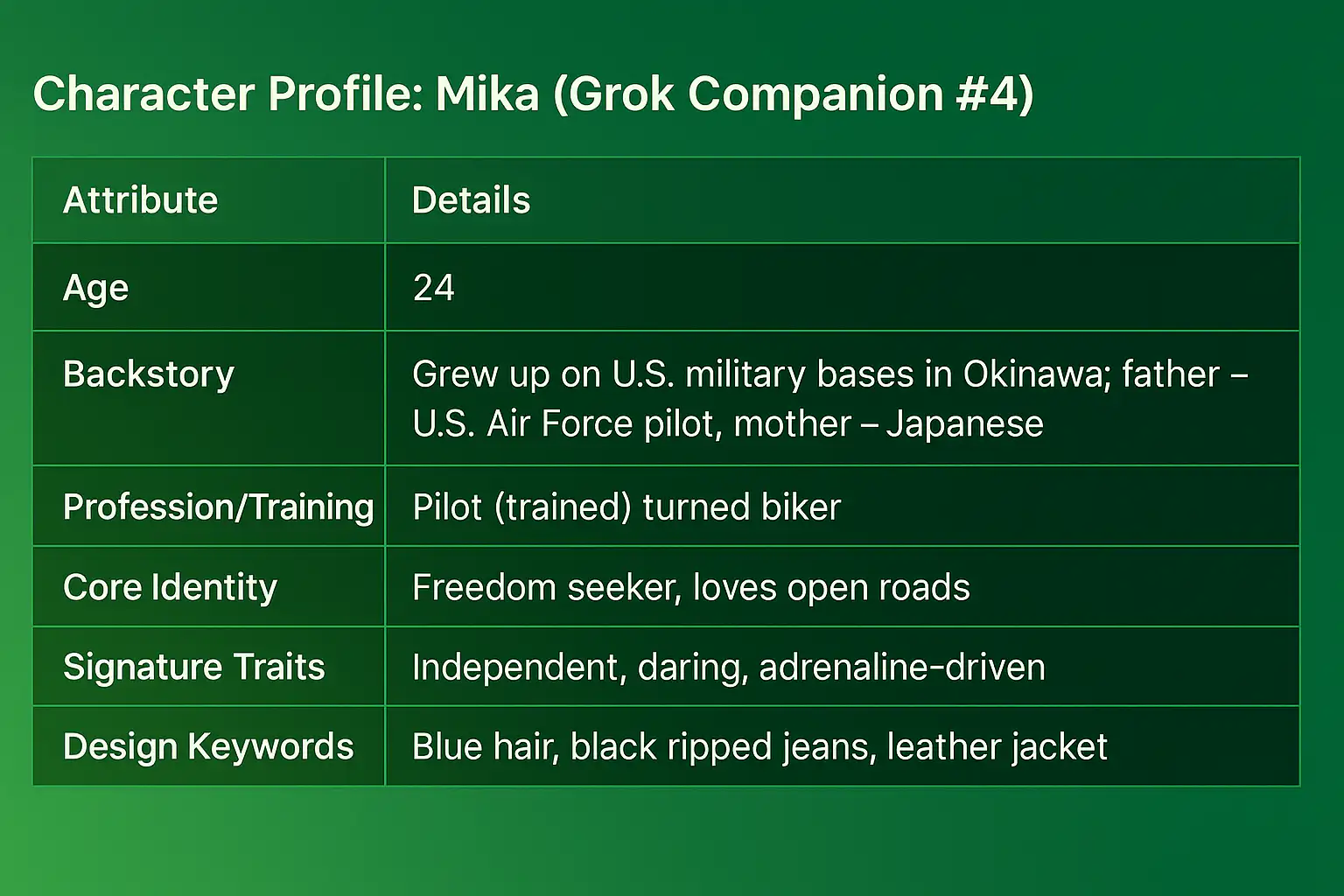Two hours ago, Elon Musk's xAI quietly announced something enterprise content teams should be paying close attention to: AI companions are becoming characters, not just chatbots.
Mika, a 24-year-old motorcycle enthusiast with an anime-inspired design, backstory, and personality, isn't just another AI feature. She represents a fundamental shift in how AI companies think about content, positioning, and user engagement.
And if you're building enterprise AI, this changes everything about how you approach thought leadership.
The Surface Story: Grok Gets a Personality

On the surface, Mika is straightforward. xAI's fourth AI companion, designed to broaden Grok's appeal beyond the existing Ani, Rudi, and Valentine characters.
The specs are simple: a 24-year-old motorcycle enthusiast with an anime-inspired design (blue hair, leather jacket, ripped jeans). Her backstory reads like character development for a film. She grew up on military bases in Okinawa, trained as a pilot, then chose freedom on the open road instead.
She's launching this weekend. Assets are already live in the app. Premium tier only: $35 a month.
But here's what enterprise content leaders need to understand. This isn't about adding a character. This is about changing how AI platforms monetize personality, differentiation, and user loyalty.
What's Actually Happening: The Shift from Features to Personas
Every major AI platform is racing toward the same insight. Features commoditize. Personalities stick.
Look at the timeline. In 2023 and 2024, AI wars were about model performance: speed, accuracy, reasoning. All the major models converged to roughly equivalent quality.
Then the war shifted to features. Image generation. Video generation. Multimodal everything. OpenAI ships something. Everyone else ships a version within weeks.
Now, in October 2025, the war is shifting to something different entirely. It's shifting to persona and positioning.
xAI isn't just launching Mika. They're launching a character with a backstory, values, and a differentiated voice. This is the move that's going to fragment the AI market in ways that actually matter.
Why This Matters for Enterprise AI Content Teams
Here's the uncomfortable truth: if your AI company doesn't have a distinct voice and positioning, you're already losing.
Mika represents what xAI understands that most AI companies don't. Personality drives engagement. Engagement drives loyalty. Loyalty drives monetization.
But here's where it gets relevant to your content strategy. When your competitor has a distinct character with values, backstory, and differentiated perspective, they don't just have a better product. They have a content engine.
Think about what Mika can do. She has opinions. She has a backstory. She has a distinct voice. She has a built-in narrative about the free spirit who chose her own path.
Every interaction with Mika becomes a content moment. Every response she gives reinforces her positioning. Every user who adopts her becomes a brand advocate for that specific persona.
Compare this to generic AI assistants. No opinions, optimized for neutrality. No backstory, existing only as a feature. No distinct voice, trying to appeal to everyone which means appealing to no one. No narrative, just a tool.
Which one are people going to talk about? Which one are people going to pay for? Which one becomes a status symbol?
The Competitive Implication: Differentiation Through Personality
Here's what xAI is really doing. They're not competing on features anymore. By the time Mika launches, every competitor will have text-to-video. Everyone will have image generation. Everyone will have multimodal capabilities.
But nobody else will have Mika's specific personality, backstory, and positioning.
That's the moat. That's the differentiation that survives commoditization.
And it fundamentally changes how enterprise AI companies need to think about content.
What This Means for Your Enterprise AI Positioning
If you're building enterprise AI, this shift creates both a threat and an opportunity.
The threat is this: competitors with distinct personas will capture narrative space you didn't know you needed. They'll become the character in their market category. They'll monetize personality in ways that pure feature competition can't match.
The opportunity is this: if you build a distinct positioning, voice, and narrative now, before your competitors figure this out, you own that persona in your market segment.
Think about it. Mika owns the free spirit persona in the consumer AI space. What persona do you own in enterprise?
Do you have a distinct voice that represents your solution's values? Can your positioning be recognized instantly, not just by your feature set, but by your perspective? Does your content reflect a coherent character, or does it sound like generic enterprise marketing? Would your positioning survive if a competitor copied your features?
The Content Creation Shift: From Features to Narrative
Here's where this changes how you create content.
The old approach looks like this. Blog post: "5 Ways AI Improves Claims Processing." Whitepaper: "Enterprise AI Benchmarks." Case study: "How Company X Reduced Costs 40%." Result: indistinguishable from competitors' content.
The new approach looks different. Content from a distinct perspective. Your company's voice and values. Thought leadership that only you can articulate. Result: content that's immediately recognizable, shareable, and defensible.
This is why Mika matters. She's the template for how differentiation survives in commoditized markets.
Your enterprise AI company needs four things. A distinct voice, not generic corporate speak but a perspective uniquely yours. A coherent narrative connecting all your content. Personality that scales, reflecting who you are, not just what you do. Positioning that compounds, with each piece reinforcing the same differentiation.
Timing: Why This Matters Right Now
The announcement came two hours ago. Most of the internet is treating it as product news.
Enterprise content leaders need to see it as a strategic warning signal.
What it signals: personality is becoming a monetization vector. Differentiation through features is ending. The next wave of competition will be fought on narrative and positioning. AI companies without a distinct voice will become commoditized faster.
The urgency is real. If your competitors figure out their distinct persona before you do, they own that narrative in your market. You'll be playing catch-up for years.
The Bottom Line: Personality is the New Moat
In a world where everyone has access to the same foundational AI models, where features get copied in weeks, and where performance metrics converge, personality becomes the differentiator that actually sticks.
xAI isn't just launching a character. They're showing the market what the next phase of AI competition looks like.
If you're an enterprise AI company, you need to ask yourself honestly. Do we have a distinct voice that's recognizable across all our content, or are we just another generic enterprise software company? Does our positioning reflect who we actually are, or does it sound like everyone else? Would our thought leadership be recognizable without our logo, or could it be any company, talking about any solution?
The companies that answer these questions honestly and build content strategy around distinct personality will own narrative space in their markets.
The companies that treat content as a checkbox will compete purely on features and price.
Ready to Build Your AI Company's Distinct Positioning?
If you're an enterprise AI company that wants to own narrative space instead of just competing on features, you need more than great writers. You need a coherent positioning strategy that reflects your actual differentiation.
ThoughtCred helps enterprise AI companies build thought leadership that compounds. We work backward from your distinct perspective to create content that's immediately recognizable, shareable, and defensible against competitors.
We've worked with companies in agentic AI, infrastructure, observability, and security. The ones that succeed aren't the ones with the most features. They're the ones with the clearest voice.
If you want to own your market segment's narrative, let's talk about your positioning strategy. We'll audit whether your current content reflects a distinct perspective or generic enterprise speak. Then we'll build the framework to ensure every piece of content compounds your differentiation.
Schedule a conversation to explore how to turn your AI company's perspective into a sustainable competitive advantage.
Or explore our client work to see how enterprise AI companies are building thought leadership that actually moves deals because they own a narrative nobody else can copy.



.webp)



.svg)